By Joe Hakim
Beginning June 2021, Middle Child facilitated a three-week programme entitled Recover, Restart, and Reimagine. Partly inspired by their Concrete Retreat writer residency, Recover, Restart, and Reimagine was a period of masterclasses, workshops, and self-development. But what separated this programme from your usual artistic residency/development opportunity was its acknowledgement of the effect that the previous year has had on everyone trying to eke out a living in the creative sectors, not only freelance creatives, but as human beings.
One of the main driving forces behind the inception of Recover, Restart, and Reimagine was the Imagine the Future conference that Middle Child organised back in March. Taking place almost exactly a year on from the first period of lockdown in 2020, I don’t mind admitting that I was initially sheepish about attending it.
For me, ‘Imagining the Future’ meant thinking ahead for the next few weeks or months and wondering what I’d be doing for work. However, I put my misgivings to one side and what I found was a room full of grouchy, angry and confused creatives, from many different areas/fields, all ranting and moaning about pretty much the same issues I was grappling with. And it was exactly what I needed. It was exactly what everyone who attended needed. After over a year of isolation, inactivity and watching projects, opportunities – and in some cases, careers – go down the plughole, the chance to spend time in a space, even if it was virtual, with other people who felt the same way was a tonic.
Imagine the Future wasn’t about networking or meeting people to get specific projects up and running. It was about venting, connecting through shared experience, and asking difficult questions, not just about the practicalities of the industries we work in, but how we work within them and more crucially how they work with us.
Recover, Restart, and Reimagine was a direct response to the issues that emerged during the conversations. I wanted to follow its progress and examine the programme as a direct response to the circumstances that we’re all currently coping with as we crawl from the wreckage towards a post-pandemic world, and I was given permission to drop into the final discussion of Recover, Restart and Reimagine to observe. I sent some prompts for discussion, but I knew that after three weeks of intense, emotional work, the key points, themes and observations would rise up like steam escaping from a New York manhole cover. And while I won’t be quoting participants directly, here are some of my thoughts.
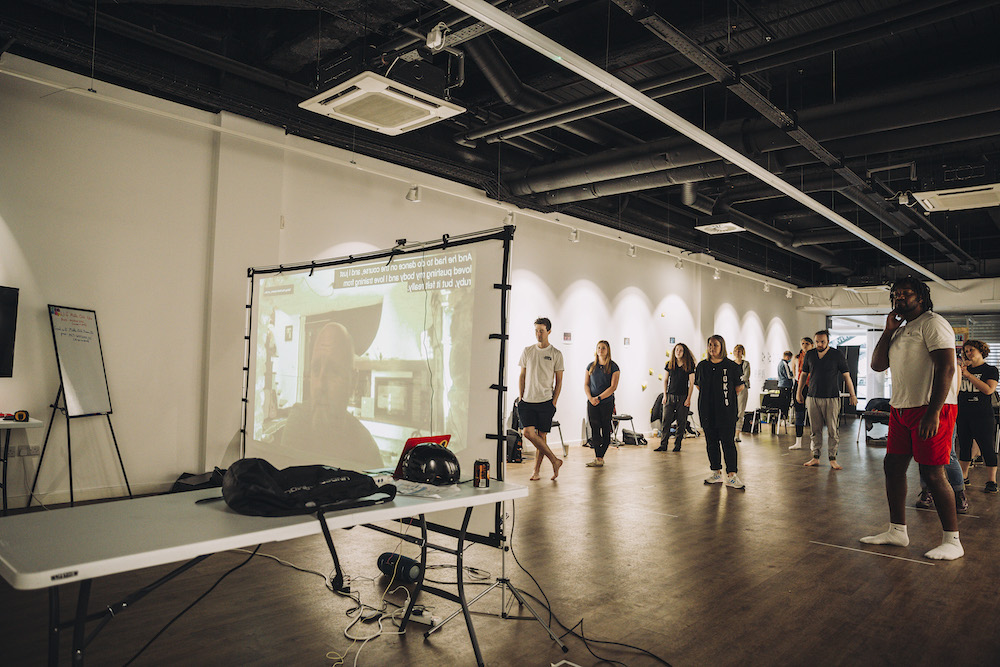
Recover, Restart and Reimagine. Photo by Anete Sooda.
Recover
Ordinarily, I would have applied for an opportunity like Recover, Restart, and Reimagine, but I decided not to, on account of receiving other support from different sources. It didn’t seem right to potentially take up a place that could be used by someone who hadn’t been as fortunate as I was in that regard. But I felt invested in it as a project and I was curious as to see how it turned out.
Shortly after the Imagine the Future conference, Middle Child, along with other organisations based in Hull, such as Hull Truck Theatre, Hull Jazz Festival, Artlink, the John Godber Company, the Adelphi Club, Wrecking Ball Press, Northern Academy of Performing Arts, ITSL and HPSS, were successful in their applications to the Cultural Recovery Fund, which were made available by the Arts Council.
Almost immediately following the news, Middle Child made a statement via their website, outlining exactly how much funding they received, and exactly how they were going to use said funds. They announced they were going to focus on working with freelancers, both in terms of activities and development and opportunities for paid work. But something that really stood out for me was their tacit commitment to focusing on physical health, mental health and well-being.
The staggering cost of the pandemic on our collective mental health has yet to be fully grasped. It doesn’t matter who you are, where you’re from or what your circumstances are, all of us at some point – if you aren’t already – will have to wrestle with the consequences.
And let’s face it, the creative industries don’t have the best track-record when it comes to promoting and encouraging good mental health and well-being. I’m going to break it down in more detail in the last section of this piece, but the very nature of freelance work and its precariousness – whatever your chosen graft – adds up to a completely seat-of-the-pants existence, that is perpetually one or two jobs away from total extinction. And this freelance, ‘you’re-only-as-safe-as-your-next-gig’ way of life now extends far beyond your creative endeavours and into every other aspect of working life, even the jobs you’d ordinarily fall back on when the stuff you’d rather be working on doesn’t pan out.
Gig theatre. Gig economy. Gig life.
All it takes is an illness, a bereavement, the arrival of a child, an accident – y’know, life stuff that happens to everyone, all the time – and you’re out of it. No benefits, no sick pay, no paid leave. No holiday time to book in. Nowt.
Imagine carrying that worry, that anxiety around with you, all the time. That feeling in your gut, that voice in your head: “I hope such-and-such is OK, so I can get focus on the next three weeks, get some work and pay the bills.”
What am I on about? If you’re reading this, chances are you don’t have to imagine it: you’re living it.
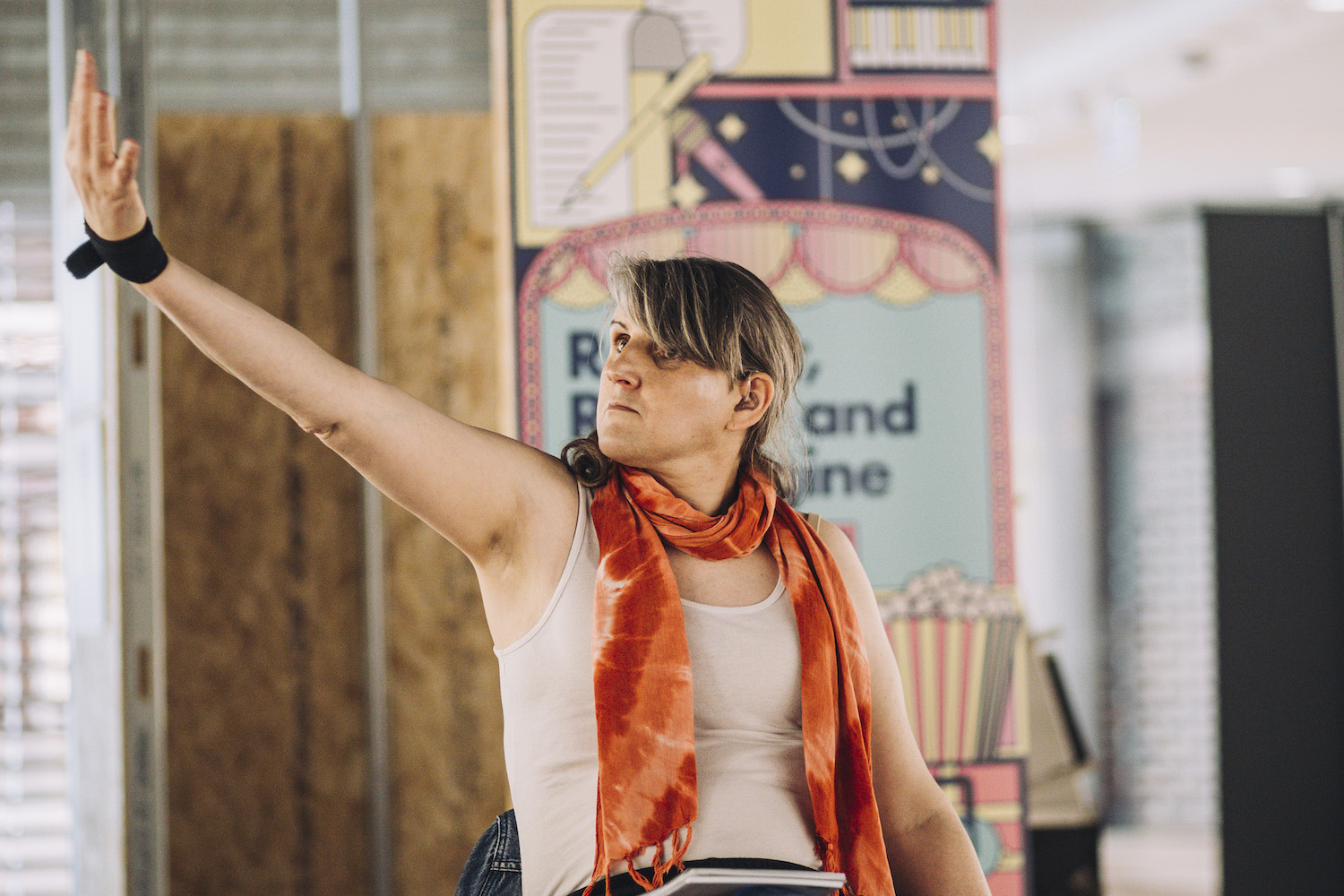
Recover, Restart and Reimagine. Photo by Anete Sooda.
Restart
When the participants were announced for Recover, Restart, and Reimagine, something I immediately noticed was the range of the circumstances and backgrounds of the participants and the different areas they work in. This meant that when I got to sit on the final session, I got the chance to find out how lockdown and Covid-19 has affected practitioners across a wide range of age and experience. One of the key issues highlighted was how these past few months has been for actors, writers, directors and producers that graduated last year.
If you’ve been doing the freelance thing for a few years, put yourself in the position of being at the beginning of your career and graduating into the wasteland that was 2020, because the next generation of talent will not only have to overcome the ‘traditional’ barriers to careers in the arts, but will have an entirely new set to break through. And when you consider that theatre as an industry is notoriously difficult to break into, those impossibly high barriers to entry have just become stratospheric.
When I was starting out, a sense of belligerence and injustice was enough to keep me going. “I’ll show you,” was my personal mantra, “I’ll prove you all wrong and make this work.”
It was sheer bloody-mindedness; a somewhat naïve belief that if I worked hard enough and kept writing, things would eventually work out. But when I was in the Recover, Restart, and Reimagine process listening to a young person talk about what they’ve been through this last year, I knew in my heart of hearts that, if I was starting out today, I’d have been crushed by the weight of it all. So what, exactly, is being done by the establishment to address this? While it’s very nice that things are ‘returning to normal’ and we can start filling buildings again, what are we going to do about the precious few pathways into the arts that are becoming even harder to find? Whose responsibility is it to address this?
Because I’ll tell you something now: if there was a lack of diverse voices in theatre and the creative industries before, that gap is only going to increase unless we start to address it now. And I’m not talking one-off opportunities; I’m talking dedicated, long-term investment and development for young artists. Genuine opportunities and pathways, with increased support for those who really need the leg up.
Actually, scratch that; dedicated support for emerging artists, no matter what their age. And while I appreciate that we’re all in survival mode – buildings, organisations, and companies as well as individual artists – unless we start to take stock of where we are and encourage these difficult conversations NOW, we’re potentially going to lose that generation of new artists. One of the criticisms around theatre and the arts is their tendency to be elitist. To be fair, over the last few years it feels like there’s been a little progress – not a lot, but some – owing to a willingness for more discussions around these subjects, but we’re in danger of an atavistic slide back, not just back to how things were before pandemic, but to a much worse time when inequality was even more pronounced than it is now.
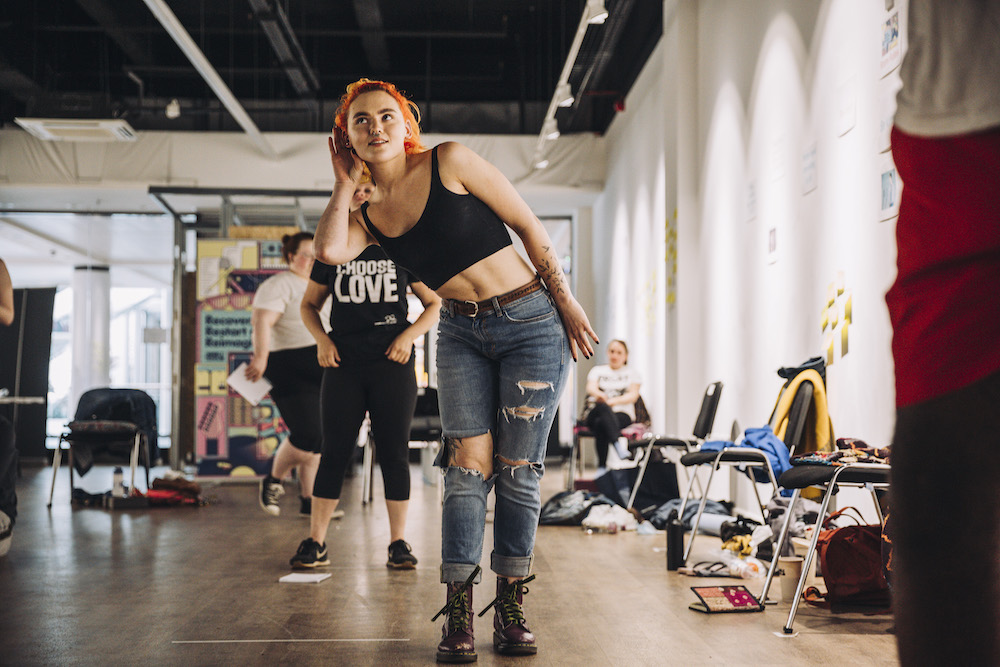
Recover, Restart and Reimagine. Photo by Anete Sooda.
Reimagine
We can’t carry on like this.
It’s difficult for me to be objective when discussing the issues that have been thrown up, but there’s one thing I’m certain of, and that’s Covid-19 has had the effect of peeling back a layer, to expose the dysfunction and inequality that already existed.
As buildings, companies and organisations have begun to grind back into life, a lot of the funds that are being made available to artists and practitioners have been in the form of small, contained opportunities or commissions.
Full disclaimer: I don’t think there’s anything inherently wrong with smaller commissions. In fact, they’re my bread and butter, and if it wasn’t for receiving three of them in quick succession at the end of last year, I dread to think how I’d have got through Christmas after losing my job. But let’s do a quick thought-experiment, shall we?
Let’s say that I want to fully focus on getting my work out there. I want to create, to make stuff, theatre, literature, music, whatever. If your average commission is between £1-2k, that means to stand a chance of a decent yearly income, you’re looking at doing about one a month per year to earn in the region of say £18k (national average wage is £31,461 as of 2021), and that includes applying for them in this time as well.
“But that’s ridiculous, Joe. Most of these opportunities come with the caveat that additional funding must be found, to get the project up and runnin.”
Okay, so let’s say I cut down my yearly commissions to half, take the pressure off, and set about getting one every two months instead. However, what we make up for in time by taking on less commissions is immediately lost to applying for six additional pots of funding, to support the other applications. And that’s before you even think about hiring on additional artists and producers help you achieve this. And because you’re taking on fewer commissions, not only do you have to find the funding for the projects, but you’ve also got to make up for the roughly £9k you’ve already lost by applying for fewer opportunities. Plus, there’s no guarantee you will receive additional funding, so if you don’t, you’ve got to produce something anyway.
And here’s the real kicker: this is how it was before the pandemic.
And now?
Good luck. You’re going to need it.
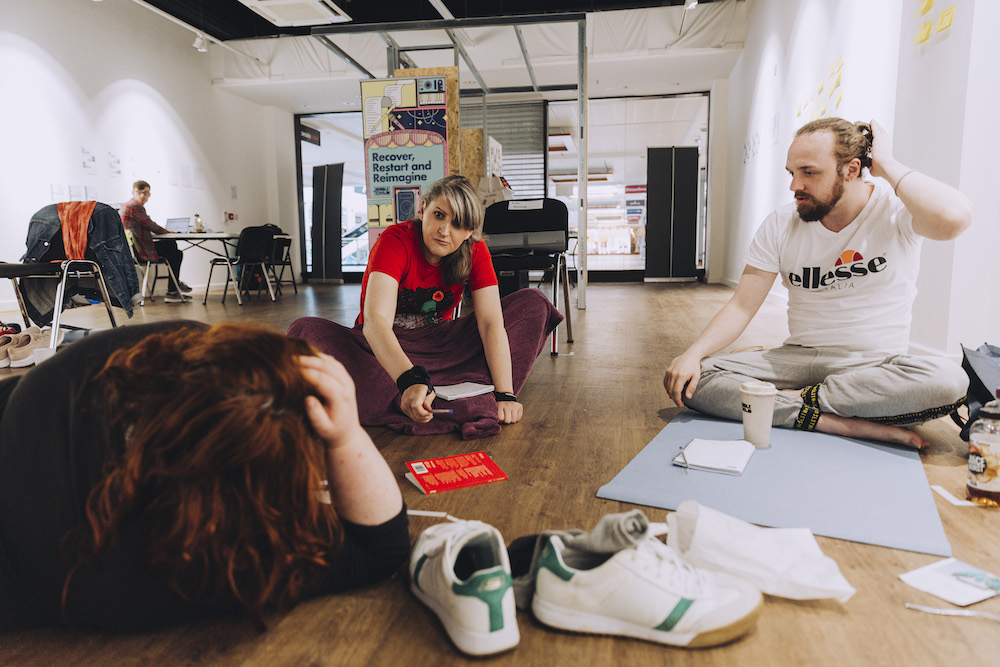
Recover, Restart and Reimagine. Photo by Anete Sooda.
I realised something earlier this year, something about Hull specifically. Following the shut-down of our local institutions, there was an explosion in creativity and art as freelancers and practitioners quickly tried to adapt to their new circumstances. But then something occurred to me: where are all the major works of art emerging from Hull? Where are the novels, the scripts, the films, the albums? Where are the young spoken word superstars, comedians or musicians heading out on their first tours?
If you ask many organisations this question, they will often reply that, by bringing work of a national and international calibre to Hull, they expose the city to new influences, art and opportunities, which in turn benefits everyone, including Hull’s own artists and creatives, by raising standards.
Fair enough, I’m sure you’ll agree. But if that’s the case, where are the results of this creative and cultural osmosis? As I say, where are the big works that are being produced in Hull to that same standard, that have been inspired by exposure to these events and activities? That take advantage of the networks and opportunities established by their existence?
And I’m not talking about City of Culture and its legacy; personally, I’m over all of that. I’ve moved on. I’ve had to. I know many other people aren’t ready to let go, but what are we going to do, erect stocks in the city centre? I’m talking about now, here in 2021, following a global pandemic.
And this isn’t to denigrate the achievement of Hull artists who have managed to find success and recognition in their chosen field. In fact, now I’ve got your attention, let me ask you this: for everyone who has had their novel, script or performance picked up or developed, how many of you had to seek advice, resources and networks outside of Hull, in order to have your work fully realised?
Obviously, these are gigantic issues we’re grappling with, but they’re not going away.
While Recover, Restart and Reimagine didn’t seek to specifically find solutions, by inviting its participants to consider them, and to explore and share their own experiences, it ignited discussion and created a space in which the participants could be honest about where they’re at, professionally and personally, which creates an atmosphere in which people can begin to talk about these issues.
Because when you boil it down, what we’re left with is this: a completely traumatised sector of freelance creatives who are being drawn back into the rat-race of punting for work and opportunities, while dealing with everything they’ve been through this last year. All these people who have been abandoned – emotionally, financially and artistically – are now expected to jump back on the merry-go-round as though nothing’s happened.
We need time to heal. We need time to recover. We need opportunities and programmes like Recover, Restart, and Reimagine, that put our health and well-being front and centre, that seek to find another way of doing things, or at least talk about it and imagine it.
Because I’ll say it again:
We can’t carry on like this.
Joe Hakim is a freelance writer and radio producer from Hull
